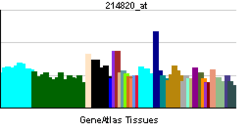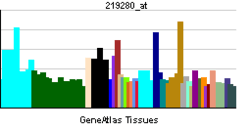Bromodomain and WD repeat-containing protein 1
Bromodomain and WD repeat-containing protein 1 (BRWD1) also known as WD repeat-containing protein 9 (WDR9) is a protein that in humans is encoded by the BRWD1 gene.[4]
Function
This gene encodes a member of the WD repeat protein family. WD repeats are minimally conserved regions of approximately 40 amino acids typically bracketed by gly-his and trp-asp (GH-WD), which may facilitate formation of heterotrimeric or multiprotein complexes. Members of this family are involved in a variety of cellular processes, including cell cycle progression, signal transduction, apoptosis, and gene regulation. This protein contains 2 bromodomains and multiple WD repeats, and the function of this protein is not known. This gene is located within the Down syndrome region-2 on chromosome 21. Alternative splicing of this gene generates 3 transcript variants diverging at the 3' ends.[4]
References
Further reading
- Hu YH, Warnatz HJ, Vanhecke D, et al. (2006). "Cell array-based intracellular localization screening reveals novel functional features of human chromosome 21 proteins". BMC Genomics. 7: 155. doi:10.1186/1471-2164-7-155. PMC 1526728
 . PMID 16780588.
. PMID 16780588.
- Huang H, Rambaldi I, Daniels E, Featherstone M (2004). "Expression of the Wdr9 gene and protein products during mouse development". Dev. Dyn. 227 (4): 608–14. doi:10.1002/dvdy.10344. PMID 12889071.
- Ramos VC, Vidal-Taboada J, Bergoñon S, et al. (2002). "Characterisation and expression analysis of the WDR9 gene, located in the Down critical region-2 of the human chromosome 21". Biochim. Biophys. Acta. 1577 (3): 377–83. doi:10.1016/s0167-4781(02)00421-9. PMID 12359327.
- Vidal-Taboada JM, Bergoñón S, Sánchez M, et al. (1998). "High resolution physical mapping and identification of transcribed sequences in the Down syndrome region-2". Biochem. Biophys. Res. Commun. 243 (2): 572–8. doi:10.1006/bbrc.1998.8141. PMID 9480850.
- Bonaldo MF, Lennon G, Soares MB (1997). "Normalization and subtraction: two approaches to facilitate gene discovery". Genome Res. 6 (9): 791–806. doi:10.1101/gr.6.9.791. PMID 8889548.


 . PMID 16780588.
. PMID 16780588.